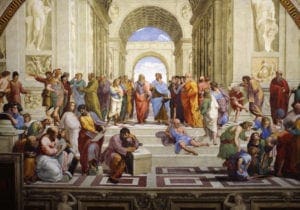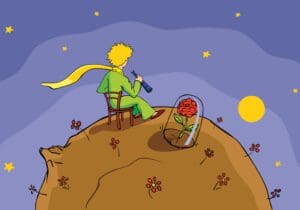
Allegoria di saggezza e forza (Paolo Veronese)
La saggezza è una qualità che ci aiuta a vivere la vita al meglio, in modo equilibrato ed etico. Per diventare saggi non esiste una formula definita, ma è chiaro che la saggezza è frutto di una buona dose d’esperienza, ma anche di un lavoro interiore e intellettuale.
Tanti filosofi, scienziati, scrittori e personaggi storici hanno dato una loro definizione alla saggezza, offrendoci vari e interessanti punti di vista.
Ecco quindi una selezione delle più belle frasi sui saggi e sulla saggezza (in inglese e italiano) che ci aiuteranno a diventare un po’ più saggi. Scoprile subito!
Aforismi, citazioni e frasi sui saggi e sulla saggezza in inglese (con traduzione)
- Nobody can give you wiser advice than yourself.
Nessuno può darti consigli più saggi che te stesso.
(Marco Tullio Cicerone) - The only true wisdom is in knowing you know nothing.
L’unica vera saggezza è sapere di non sapere nulla.
(Socrate) 
- Wisdom has its root in goodness.
La saggezza ha le sue radici nella bontà.
(Ralph Waldo Emerson) - The wise man never says everything he thinks, but always thinks everything he says.
Il saggio non dice tutto quello che pensa, ma pensa tutto quello che dice.
(Aristotele) 
- Wisdom, compassion, and courage are the three universally recognized moral qualities of men.
Saggezza compassione e coraggio sono le tre qualità morali universalmente riconosciute.
(Confucio) - A wise man hears one word and understands two.
Un uomo saggio sente una parola e ne capisce due.
(Edgar Allan Poe) - Wisdom begins in wonder.
La saggezza inizia nella meraviglia.
(Socrate) 
- Science is organized knowledge. Wisdom is organized life.
La scienza è conoscenza organizzata. La saggezza è vita organizzata.
(Immanuel Kant) - A good head and a good heart are always a formidable combination.
Una buona testa ed un buon cuore sono sempre una formidabile combinazione.
(Nelson Mandela) - The fool doth think he is wise, but the wise man knows himself to be a fool.
Il saggio sa di essere stupido, è lo stupido invece che crede di essere saggio.
(William Shakespeare) 
- The function of wisdom is to discriminate between good and evil.
La funzione della saggezza sta nel distinguere il bene dal male.
(Marco Tullio Cicerone) - To see what is in front of one’s nose needs a constant struggle.
Per vedere cosa c’è sotto il proprio naso occorre un grande sforzo.
(George Orwell) - A wise man can learn more from a foolish question than a fool can learn from a wise answer.
Un uomo saggio impara da una domanda sciocca più di quanto uno sciocco possa imparare da una risposta saggia.
(Bruce Lee) 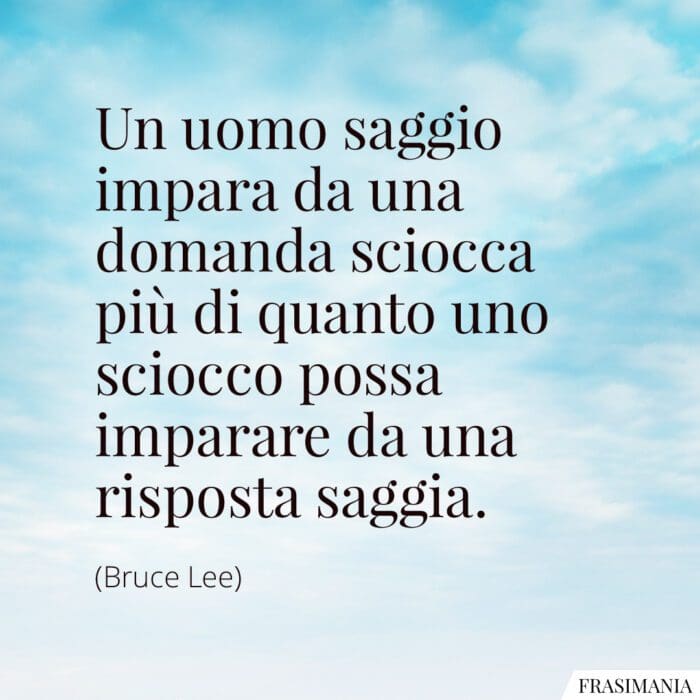
- Sometimes the greatest wisdom is not knowing or pretending not to know.
A volte la saggezza più grande consiste nel non sapere o nel fingere di non sapere.
(Baldasar Graciàn) - Be wise, because the world needs wisdom. If you cannot be wise, pretend to be someone who is wise, and then just behave like they would.
Siate saggi, perché il mondo ha bisogno di saggezza. Se non potete essere saggi, fate finta di essere qualcuno che lo è, e poi comportatevi come farebbe lui.
(Neil Gaiman) - The most certain sign of wisdom is cheerfulness.
Il più chiaro segno di saggezza è l’allegria.
(Michel de Montaigne) 
- The art of being wise is the art of knowing what to overlook.
L’arte di essere saggi è l’arte di capire a cosa si può passar sopra.
(William James) - Work like you don’t need the money. Love like you’ve never been hurt. Dance like nobody’s watching.
Lavora come se non avessi bisogno di soldi. Ama come se tu non fossi mai stato ferito. Balla come se nessuno ti stesse guardando.
(Satchel Paige) 
- Knowing yourself is the beginning of all wisdom.
Conoscere se stessi è l’inizio di ogni saggezza.
(Aristotele) - Time doesn’t make us wiser,only more cowardly.
Il tempo non ci rende più saggi, solo più vigliacchi.
(Carlos Ruiz Zafón) - A clever person solves a problem. A wise person avoids it.
Una persona intelligente risolve un problema. Una persona saggia lo evita.
(Albert Einstein) 
- By three methods we may learn wisdom: pirst, by reflection, which is noblest; second, by imitation, which is easiest; and third by experience, which is the bitterest.
Esistono tre modi per imparare la saggezza: primo, con la riflessione, che è il metodo più nobile; secondo, con l’imitazione, che è il metodo più facile; terzo, con l’esperienza, che è il metodo più amaro.
(Confucio) - The foolish and the dead alone never change their opinions.
Solo i morti e gli stupidi non cambiano mai opinione.
(James Russell Lowell) 
- The young man knows the rules, but the old man knows the exceptions.
Il giovane conosce le regole, ma il vecchio conosce le eccezioni.
(Oliver Wendell Holmes) - Yesterday I was clever, so I wanted to change the world. Today I am wise, so I am changing myself.
Ieri ero intelligente e volevo cambiare il mondo. Oggi sono saggio e sto cambiando me stesso.
(Gialal al-Din Rumi) 
- Adopt the pace of nature: her secret is patience.
Adotta il ritmo della natura: il suo segreto è la pazienza.
(Ralph Waldo Emerson) - Honesty is the first chapter in the book of wisdom.
L’onestà è il primo capitolo del libro della saggezza.
(Thomas Jefferson) 
- Every generation imagines itself to be more intelligent than the one that went before it, and wiser than the one that comes after it.
Ogni generazione pensa di essere più intelligente di quella che l’ha preceduta e più saggia di quella che verrà dopo di lei.
(George Orwell) - Do not go where the path may lead; go instead where there is no path and leave a trail.
Non andare dove ti porta il sentiero. Vai invece dove il sentiero non c’è e lascia dietro di te una traccia.
(Ralph Waldo Emerson) 
- The invariable mark of wisdom is to see the miraculous in the common.
Un segno inconfondibile di saggezza sta nel vedere il miracoloso nelle piccole cose.
(Ralph Waldo Emerson) - The journey of a thousand miles begins with one step.
Anche un viaggio di mille miglia inizia con un singolo passo.
(Lao Tzu) 
- Knowledge is of no value unless you put it into practice.
La conoscenza non ha valore se non la metti in pratica.
(Anton Čechov) - We are made wise not by the recollection of our past, but by the responsibility for our future.
Ciò che ci rende saggi non è il ricordo del nostro passato, ma la responsabilità per il nostro futuro.
(George Bernard Shaw) - All men make mistakes, but only wise men learn from their mistakes.
Tutti gli uomini sbagliano, ma solo i saggi imparano dai loro errori.
(Winston Churchill) 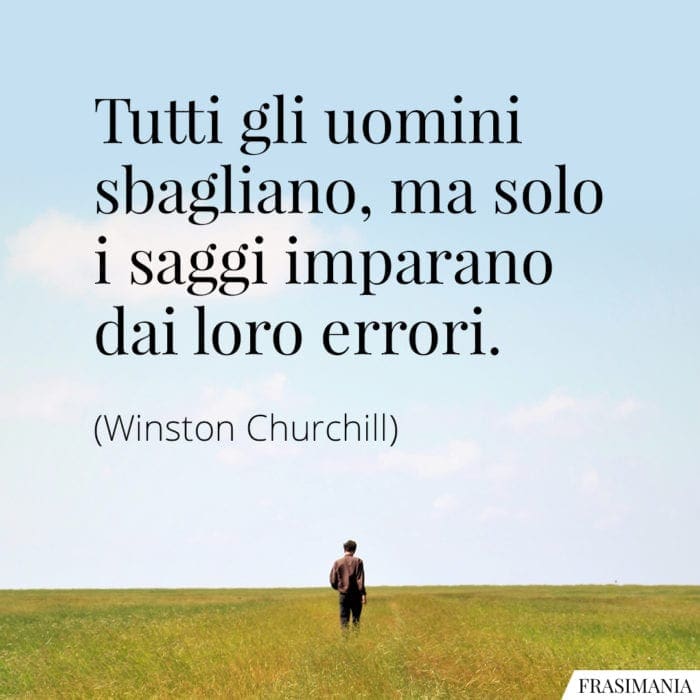
- It is easier to be wise for others than for ourselves.
È più facile essere saggi per gli altri che per se stessi.
(François de La Rochefoucauld) - The pessimist complains about the wind; the optimist expects it to change; the realist adjusts the sails.
Il pessimista si lamenta del vento. L’ottimista aspetta che cambi. Il realista aggiusta le vele.
(William Arthur Ward) 
- No one is wise at all times.
Nessun mortale è saggio a tutte le ore.
(Plinio il Vecchio) - The trouble with the world is that the stupid are cocksure and the intelligent are full of doubt.
Il problema dell’umanità è che gli stupidi sono strasicuri, mentre gli intelligenti sono pieni di dubbi.
(Bertrand Russell) 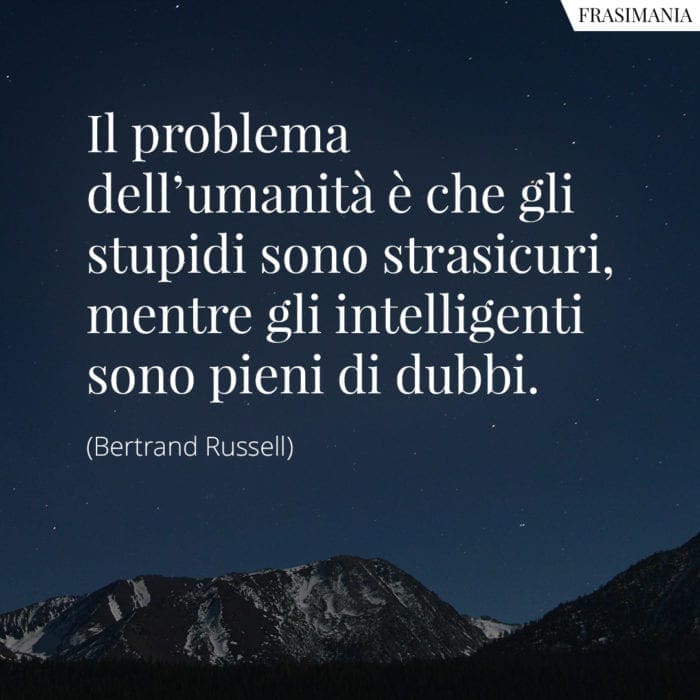
- Don’t find fault, find a remedy.
Non trovare l’errore. Trova il rimedio.
(Henry Ford) - A man should never be ashamed to own that he has been in the wrong, which is but saying in other words that he is wiser today than he was yesterday.
Un uomo non dovrebbe mai vergognarsi di essere stato nel torto, in quanto equivale a dire che oggi è più saggio di ieri.
(Alexander Pope) - Wisdom comes with winters.
La saggezza arriva con gli inverni.
(Oscar Wilde) 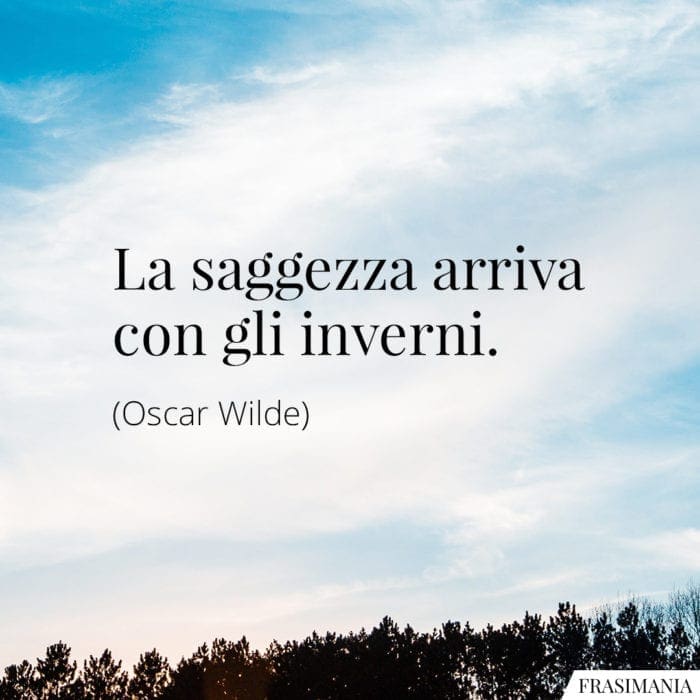
- Experience is not what happens to you; it’s what you do with what happens to you.
L’esperienza non è ciò che ti succede. È ciò che fai con quello che ti succede.
(Aldous Huxley) - All men make mistakes, but a good man yields when he knows his course is wrong, and repairs the evil. The only crime is pride.
Tutti gli uomini commettono errori, ma un uomo saggio si arrende quando capisce di avere sbagliato e ripara l’errore. L’unico crimine è l’orgoglio.
(Sofocle) - Whenever you find yourself on the side of the majority, it is time to pause and reflect.
Quando ti trovi d’accordo con la maggioranza, è il momento di fermarti e riflettere.
(Mark Twain) 
- It is wise to direct your anger towards problems – not people; to focus your energies on answers – not excuses.
È saggio orientare la tua rabbia verso i problemi, non verso le persone; focalizzare le tue energie sulle risposte, non sulle scuse.
(William Arthur Ward) - Wise is the man who contents himself with the spectacle of the world.
Saggio è colui che si contenta dello spettacolo del mondo.
(Fernando Pessoa) 
- I was in darkness, but I took three steps and found myself in Paradise. The first step was a good thought, the second, a good word; and the third, a good deed.
Ero nell’oscurità, ma ho fatto tre passi e mi sono trovato in Paradiso. Il primo passo è stato un pensiero buono, il secondo, una parola buona; e il terzo, una buona azione.
(Friedrich Nietzsche) - Justice without wisdom is impossible.
Non esiste giustizia senza saggezza.
(James Anthony Froude) - The foolish man seeks happiness in the distance; the wise grows it under his feet.
Lo sciocco cerca la felicità lontano, il saggio la fa crescere sotto i suoi piedi.
(James Oppenheim) 
- The wise man doesn’t give the right answers, he poses the right questions.
L’uomo saggio non dà le giuste risposte, ma pone le giuste domande.
(Claude Levi-Strauss) - I am not young enough to know everything.
Non sono abbastanza giovane per sapere tutto.
(Oscar Wilde) 
- Knowledge speaks, but wisdom listens.
La conoscenza parla, ma la saggezza ascolta.
(Jimi Hendrix) - Sell your cleverness and buy bewilderment.
Vendi la tua intelligenza e compra stupore.
(Gialal al-Din Rumi) - The heart is wiser than the intellect.
Il cuore è più saggio dell’intelletto.
(Josiah Gilbert Holland) 
- Age does not bring you wisdom, age brings you wrinkles.
L’età non porta saggezza, l’età porta rughe.
(Estelle Getty) - We can know only that we know nothing. And that is the highest degree of human wisdom.
Possiamo sapere soltanto che non sappiamo nulla. E questo è il grado supremo della sapienza umana.
(Lev Tolstoj) - He who knows all the answers has not been asked all the questions.
Chi conosce tutte le risposte, non si è fatto tutte le domande.
(Confucio) 
- There is a wisdom of the head, and a wisdom of the heart.
C’è una saggezza della testa e una saggezza del cuore.
(Charles Dickens) - There are many things of which a wise man might wish to be ignorant.
Ci sono molte cose che una persona saggia dovrebbe augurarsi di non sapere.
(Ralph Waldo Emerson) - The stupidity of people comes from having an answer for everything. The wisdom of the novel comes from having a question for everything.
La stupidità deriva dall’avere una risposta per ogni cosa. La saggezza deriva dall’avere, per ogni cosa, una domanda.
(Milan Kundera) 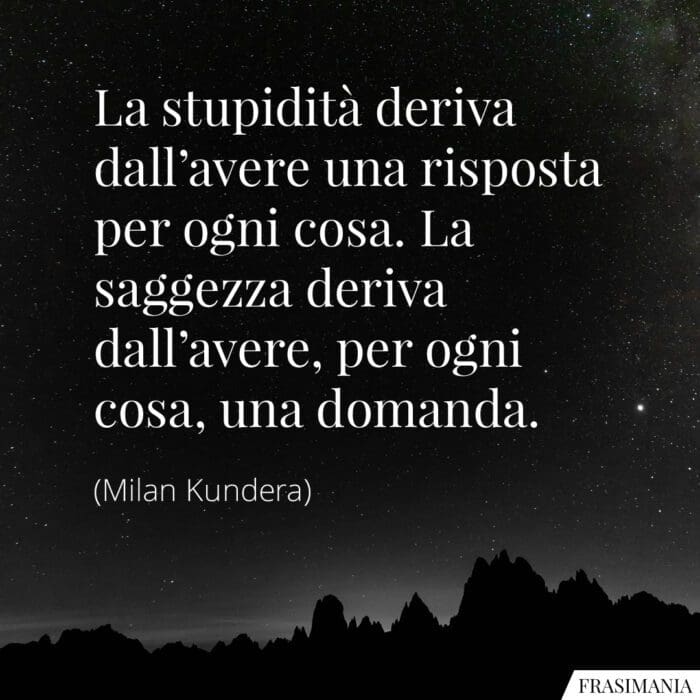
- Doubt is the origin of wisdom.
Il dubbio è l’origine della saggezza.
(Cartesio) - What wisdom can you find that is greater than kindness?
Quale saggezza puoi trovare che sia più grande della gentilezza?
(Jean-Jacques Rousseau) - May you live every day of your life.
Vivi ogni giorno della tua vita.
(Jonathan Swift) 
- The only man who never makes mistakes is the man who never does anything.
L’unica persona che non commette mai errori è quella che non fa mai niente.
(Theodore Roosevelt) - Life’s tragedy is that we get old too soon and wise too late.
La tragedia della vita è che diventiamo vecchi troppo presto e saggi troppo tardi.
(Benjamin Franklin) 
- A wise man hears one word and understands two.
Una persona saggia sente una parola e ne capisce due.
(Edgar Allan Poe) - Patience is the companion of wisdom.
La pazienza è la compagna della saggezza.
(Agostino d’Ippona) - Rather be a fool on one’s own account than a wise man in the opinion of others.
Meglio essere folle per proprio conto che saggio con le opinioni altrui.
(Friedrich Nietzsche) 
- Knowing others is wisdom, knowing yourself is Enlightenment.
Conoscere le persone è saggezza, ma conoscere se stessi è illuminazione.
(Lao Tzu) - The beginning of wisdom is to desire it.
L’inizio della saggezza è nel desiderarla.
(Avicebron) - Everyone has stupid thoughts, but the sage keeps quiet about them.
Tutti hanno dei pensieri stupidi, ma il saggio li tace.
(Wilhelm Busch) 
- Knowing yourself is the beginning of all wisdom.
Conoscere se stessi è il principio di tutta la saggezza.
(Aristotele) - And call none among you foolish for we are neither wise nor foolish. We are green leaves upon the tree of life and surely life itself if beyond wisdom and surely beyond foolishness.
Non chiamare stolto nessuno, giacché in verità noi non siamo né saggi né stolti. Siamo verdi foglie sull’albero della vita, e la vita stessa è al di là della saggezza e, certo, al di là della stoltezza.
(Khalil Gibran) - It is better to listen to the rebuke of a wise man than for one to listen to the song of fools.
Meglio ascoltare il rimprovero di un saggio che ascoltare la lode degli stolti.
(Qoèlet 7:5) 
- True wisdom comes to each of us when we realize how little we understand about life, ourselves, and the world around us.
La vera saggezza arriva in ognuno di noi quando ci rendiamo conto di quanto poco comprendiamo la vita, noi stessi e il mondo che ci circonda.
(Socrate) - It is unwise to be too sure of one’s own wisdom. It is healthy to be reminded that the strongest might weaken and the wisest might err.
Non è saggio essere troppo sicuri della propria saggezza. È salutare ricordare che il più forte può indebolirsi e il più saggio può sbagliare.
(Mahatma Gandhi) - There is always some madness in love. But there is also always some reason in madness.
Nell’amore c’è sempre un po’ di follia. Ma nella follia c’è sempre un po’ di saggezza.
(Friedrich Nietzsche) 
- It’s not what happens to you, but how you react to it that matters.
Non conta cosa che ti accade, ma come reagisci.
(Epitteto) - The more I read, the more I acquire, the more certain I am that I know nothing.
Più leggo, più imparo, più sono certo di non sapere nulla.
(Voltaire) - The ignorant assert, the experts doubt, the wise reflect.
L’ignorante afferma, il colto dubita, il saggio pensa.
(Aristotele) 
- For to be wise and love exceeds man’s might.
Essere saggio e amare eccede le capacità umane.
(William Shakespeare) - The first step in the acquisition of wisdom is silence, the second listening, the third memory, the fourth practice, the fifth teaching others.
Il primo passo nell’acquisizione della saggezza è il silenzio, il secondo è l’ascolto, il terzo è il ricordo, il quarto l’esercizio, il quinto l’insegnare agli altri.
(Avicebron) - Dare to be wise.
Abbiate il coraggio di essere saggi.
(Quinto Orazio Flacco) 
- When proven wrong, the wise man will correct himself and the ignorant will keep arguing.
Quando l’errore viene provato, l’uomo saggio si correggerà e l’ignorante continuerà a discutere.
(Ali ibn Abi Talib) - The stupid neither forgive nor forget; the naive forgive and forget; the wise forgive but do not forget.
Lo sciocco non perdona e non dimentica. L’ingenuo perdona e dimentica. Il saggio perdona, ma non dimentica.
(Thomas Szasz) - Let us not take ourselves too seriously. None of us has a monopoly of wisdom.
Cerchiamo di non prenderci troppo sul serio. Nessuno di noi ha il monopolio della saggezza.
(Elisabetta II del Regno Unito) 
- Where wisdom reigns, there is no conflict between thinking and feeling.
Dove regna la saggezza, non vi è alcun conflitto tra pensiero e sentimento.
(Carl Gustav Jung) - A wise man is superior to any insults which can be put upon him, and the best reply to unseemly behavior is patience and moderation.
Un uomo saggio è superiore a qualsiasi insulto che può essergli rivolto, e la migliore risposta a comportamenti sconvenienti è la pazienza e la moderazione.
(Moliere) - A wise man will make more opportunities than he finds.
Una persona saggia crea più opportunità di quante ne trova.
(Francesco Bacone) 
- To be idle is a short road to death and to be diligent is a way of life; foolish people are idle, wise people are diligent.
Essere pigro è una breve strada verso la morte ed essere diligente è uno stile di vita; la gente sciocca è pigra, i saggi sono diligenti.
(Buddha) - A wise man will make more opportunities than he finds.
Un uomo saggio coglie più occasioni di quante ne trova.
(Francesco Bacone) - Of all the things which wisdom provides to make us entirely happy, much the greatest is the possession of friendship.
Di tutte le cose che la saggezza procura per ottenere un’esistenza felice, la più grande è l’amicizia.
(Epicuro) 
- From the errors of others, a wise man corrects his own.
Dagli errori degli altri, il saggio corregge i propri.
(Publilio Siro) - Into the darkness they go, the wise and the lovely.
Nell’oscurità se ne vanno, i saggi e gli attraenti.
(Edna St. Vincent Millay) - Don’t judge each day by the harvest you reap but by the seeds that you plant.
Non giudicare ogni giorno dal raccolto che hai ottenuto, ma dai semi che hai piantato.
(Robert Louis Stevenson) 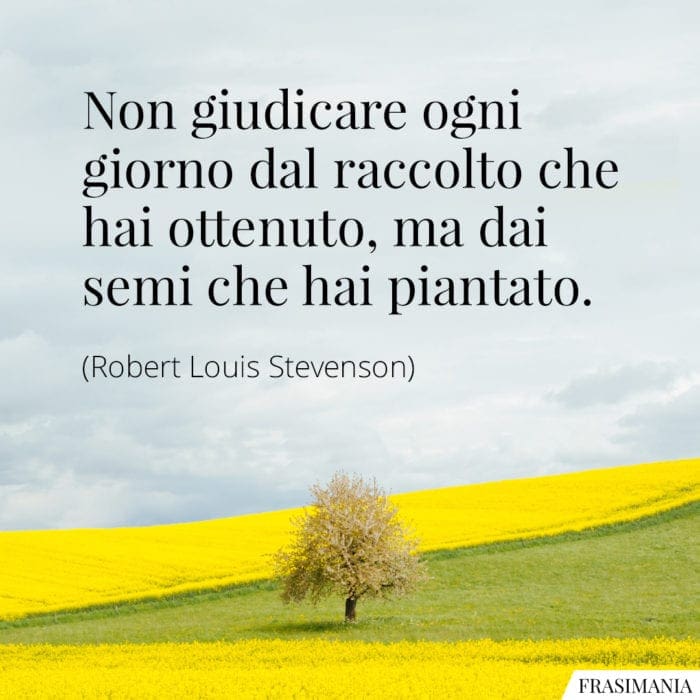
- How prone to doubt, how cautious are the wise.
Quanto sono inclini a dubitare, quanto cauti sono i saggi.
(Omero) - Knowledge is proud that he has learn’d so much; wisdom is humble that he knows no more.
La conoscenza è orgogliosa di aver imparato tanto; la saggezza è avvilita perché non conosce abbastanza.
(William Cowper) - The art of being wise is the art of knowing what to overlook.
L’arte di essere saggi è l’arte di sapere che cosa trascurare.
(William James)






